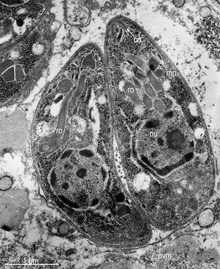細胞內寄生物
外觀
細胞內寄生物(英語:intracellular parasite)是指一類寄生於宿主細胞中生長、繁殖的微生物,可分為兼性(facultative)和專性(obligate)寄生物。此術語含蓋任何生物和病毒;若為細菌,又稱胞內寄生菌。
部分細胞內寄生物會導致相關疾病的發生。
兼性寄生物
[編輯]兼性寄生物可以在胞內寄生,於胞外也可以存活[1]。
屬於兼性寄生物的細菌舉例如下:
- 漢氏巴爾通體(Bartonella henselae)[2]
- 兔熱病桿菌(Francisella tularensis)[3]
- 李斯特菌[4]
- 傷寒沙門氏菌(Salmonella typhi)[5]
- 布魯氏菌屬(Brucella)[6]
- 軍團菌屬[7]
- 部分分枝桿菌(Mycobacterium)[8]
- 諾卡氏菌(Nocardia)[9]
- 紅球菌(Rhodococcus equi)[10]
- 耶爾辛氏菌屬[11]
- 腦膜炎雙球菌(Neisseria meningitidis)[12]
屬於兼性寄生物的真菌舉例如下:
專性寄生物
[編輯]
專性寄生物只能在寄生細胞內存活,生活完全依賴於宿主細胞內的資源。
專性寄生物有:
- 一部分細菌,比如:
- 部分原生生物,比如:
- 一部分真菌,比如:
對專性寄生物的研究難度較高,因為他們通常不能在宿主外增殖。2009年,研究人員發現Q型流感的病原體貝氏柯克斯體(Coxiella burnetii)可以在一種無菌培養基上培養。他們在論文中提出,這種技術也許亦可以應用在其他病原體上[18]。
值得一提的是,內共生理論認為,粒線體最初也是寄生於細胞內的專性寄生物,但最後發展成了共生關係乃至成為細胞器[19]。
營養
[編輯]細胞內寄生物主要依靠宿主細胞的能量生長繁殖,他們尤其需要在脫離宿主細胞時難以獲取的營養物質。兼性細胞內寄生物嗜肺軍團菌(Legionella pneumophila)目前是研究細胞內寄生物獲取宿主細胞營養的標準研究模型。目前的研究表明,嗜肺軍團菌通過促進宿主細胞蛋白自我分解或通過蛋白酶體分解,將這些蛋白質變為胺基酸。嗜肺軍團菌可以用這些胺基酸作為碳源和主要的能量來源[20]。
敏感性
[編輯]T細胞功能受損的人群(如AIDS患者)較難清除侵入體內的病原性細胞內寄生物[21]。
參見
[編輯]參考
[編輯]- ^ 李雍龍等. 人體寄生蟲學 第7版. 人民衛生出版社. 2009: 9. ISBN 978-7-117-09971-4.
- ^ Bartonella henselae (PDF). [2018-01-20]. (原始內容存檔 (PDF)於2020-11-01).
- ^ Ryan KJ; Ray CG (editors). Sherris Medical Microbiology 4th. McGraw Hill. 2004: 488–90. ISBN 0-8385-8529-9.
- ^ Dramsi, Shaynoor; Cossart, Pascale. Listeriolysin O. The Journal of Cell Biology. 2002-03-18, 156 (6): 943–946. ISSN 0021-9525. PMC 2173465
 . PMID 11901162. doi:10.1083/jcb.200202121.
. PMID 11901162. doi:10.1083/jcb.200202121.
- ^ Jantsch, J.; Chikkaballi, D.; Hensel, M. Cellular aspects of immunity to intracellular Salmonella enterica. Immunological Reviews. 2011, 240 (1): 185–195. PMID 21349094. doi:10.1111/j.1600-065X.2010.00981.x.
- ^ Celli, Jean. The changing nature of the Brucella-containing vacuole. Cellular Microbiology. 2015, 17 (7): 951–8. PMC 4478208
 . PMID 25916795. doi:10.1111/cmi.12452.
. PMID 25916795. doi:10.1111/cmi.12452.
- ^ W T Martin; et al. Proliferation of Legionella pneumophila as an intracellular parasite of the ciliated protozoan Tetrahymena pyriformis.. Appl Environ Microbiol. 1984 Mar; 47(3): 467–471. 1913.
- ^ Silva MT; et al. Pathogenetic mechanisms of the intracellular parasite Mycobacterium ulcerans leading to Buruli ulcer.. Lancet Infect Dis. 2009 Nov;9(11):699-710.
- ^ Beaman BL; Beaman L. Nocardia asteroides as an invasive, intracellular pathogen of the brain and lungs. Subcell Biochem. 2000;33:167-97.
- ^ Kelly, B. G.; Wall, D. M.; Boland, C. A.; Meijer, W. G. Isocitrate lyase of the facultative intracellular pathogen Rhodococcus equi. Microbiology. 2002, 148 (Pt 3): 793–798. PMID 11882714. doi:10.1099/00221287-148-3-793.
- ^ Yuehua Ke; Zeliang Chen; Ruifu Yang. Yersinia pestis: mechanisms of entry into and resistance to the host cell. Front Cell Infect Microbiol. 2013; 3: 106. 2013-12-24.
- ^ Spinosa MR, Progida C, Talà A, Cogli L, Alifano P, Bucci C. The Neisseria meningitidis capsule is important for intracellular survival in human cells. Infect. Immun. July 2007, 75 (7): 3594–603 [2017-10-27]. PMC 1932921
 . PMID 17470547. doi:10.1128/IAI.01945-06. (原始內容存檔於2019-12-10).
. PMID 17470547. doi:10.1128/IAI.01945-06. (原始內容存檔於2019-12-10).
- ^ Sebghati TS, Engle JT, Goldman WE. Intracellular parasitism by Histoplasma capsulatum: fungal virulence and calcium dependence. Science. November 2000, 290 (5495): 1368–72 [2017-10-27]. PMID 11082066. doi:10.1126/science.290.5495.1368. (原始內容存檔於2019-12-10).
- ^ Alvarez, M.; Burns, T.; Luo, Y.; Pirofski, L. A.; Casadevall, A. The outcome of Cryptococcus neoformans intracellular pathogenesis in human monocytes. BMC Microbiology. 2009, 9: 51. PMC 2670303
 . PMID 19265539. doi:10.1186/1471-2180-9-51.
. PMID 19265539. doi:10.1186/1471-2180-9-51.
- ^ Amann R, Springer N, Schönhuber W, et al. Obligate intracellular bacterial parasites of acanthamoebae related to Chlamydia spp. Applied and Environmental Microbiology. January 1997, 63 (1): 115–21 [2017-10-27]. PMC 168308
 . PMID 8979345. (原始內容存檔於2019-12-10).
. PMID 8979345. (原始內容存檔於2019-12-10).
- ^ Deng, M.; Lancto, C. A.; Abrahamsen, M. S. Cryptosporidium parvum regulation of human epithelial cell gene expression. International Journal for Parasitology. 2004, 34 (1): 73–82. PMID 14711592. doi:10.1016/j.ijpara.2003.10.001.
- ^ Page 28 (頁面存檔備份,存於網際網路檔案館) in: Title: Rook's textbook of dermatology, Volume 4, Rook's Textbook of Dermatology, Tony Burns (FRCP.) Authors: Arthur Rook, Tony Burns (FRCP.) Edition: 8 Publisher: John Wiley and Sons, 2010 ISBN 1-4051-6169-8, ISBN 978-1-4051-6169-5
- ^ Omsland, Anders; Cockrell, Diane C.; Howe, Dale; Fischer, Elizabeth R.; Virtaneva, Kimmo; Sturdevant, Daniel E.; Porcella, Stephen F.; Heinzen, Robert A. Host cell-free growth of the Q fever bacterium Coxiella burnetii. Proceedings of the National Academy of Sciences USA. Mar 17, 2009, 106 (11): 4430–4 [September 18, 2011]. PMC 2657411
 . PMID 19246385. doi:10.1073/pnas.0812074106.
. PMID 19246385. doi:10.1073/pnas.0812074106.
- ^ Lynn Sagan. On the origin of mitosing cells. J Theor Biol. 1967, 14 (3): 255–274. PMID 11541392. doi:10.1016/0022-5193(67)90079-3.
- ^ Heuner K; Swanson M (editors). (2008). Legionella: Molecular Microbiology. Caister Academic Press.
- ^ Page 432 (頁面存檔備份,存於網際網路檔案館), Chapter 22, in: Jones, Jane; Bannister, Barbara A.; Gillespie, Stephen H. Infection: Microbiology and Management. Wiley-Blackwell. 2006. ISBN 1-4051-2665-5.
